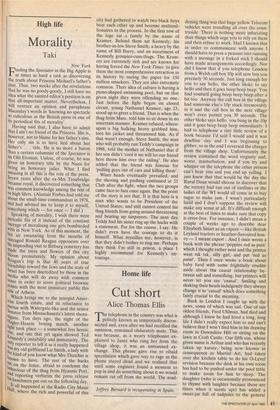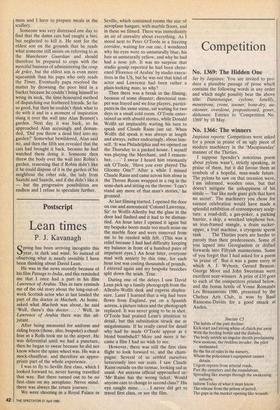Home life
Cut short
Alice Thomas Ellis
The telephone in the country was what is politely known as temporarily discon- nected and, even after we had rectified the omission, remained obdurately mute. This was because, as a weary telephonist ex- plained to Janet who rang her from the village shop, it was an unmanned ex- change. This phrase gave rise to ribald speculation which gave way to rage as the phone stayed dead and we realised that until some engineer found a moment to pop in and do something about it we would remain cut off from the world. The mad- dening thing was that huge yellow Telecom vehicles were trundling all over the coun- tryside. There is nothing more infuriating than things which urge you to rely on them and then refuse to work. Had I known that in order to communicate with anyone I should have to press a peasant into running with a message in a forked stick I should have made arrangements accordingly. Nor did I know that if you telephone London from a Welsh call box 10p will now buy you precisely 30 seconds. Just long enough for you to say hello, the other bloke to say hello and then it goes beep beep beep. You find yourself going beep beep beep after a bit too. Anyway the call box in the village had someone else's 10p stuck irremovably in it and the call box in the next village won't even permit you 30 seconds. The other bloke says hello, you bang in the 10p and it goes beep beep beep immediately. I had to telephone a tiny little review of a book because I'd said I would and it was deadline day and I was beginning to gibber, so in the end I reversed the charges from the village shop. Unfortunately the review contained the word virginity and, worse, masturbation, and if you try and whisper on the telephone the other person,. can't hear you and you end up yelling. I just knew that that would be the day the Rural Dean would choose to discover that the rectory had run out of sardines or the ladies of the WI would all come in to buy sugar to make jam. I wasn't particularly lucid and I don't suppose the review will make any sense at all. It's difficult enough at the best of times to make sure that copy is error-free. For instance, I didn't mean a couple of weeks ago to describe dear Elizabeth Smart as an export — like British Leyland tractors or heather-flavoured hon- ey — I meant expert . And I once wrote a book with the phrase 'poppies red as pain' which I thought rather neat and the printer went tsk tsk, silly girl, and put `red as paint'. Then I once wrote a book about
baby food with some frightfully erudite aside about the causal relationship be-
tween salt and something, but printers will never let you say 'causal'. Smiling and shaking their heads indulgently they always change it to 'casual' which does something fairly crucial to the meaning.
Back in London I caught up with the news, some of which was sad. One of our oldest friends, Fred Uhlman, had died and although I knew he had lived a long, long life I didn't really expect him to and can't believe that I won't find him in his drawing room in Downshire Hill or sitting on the lawn at Croft Castle. Our fifth son, whose given name is Arthur and who has recently taken up karate, being now known in consequence as Martial Art, had taken over the kitchen table to do his 0-Level revision because the desk in his own room has had to be pushed under the pool table to make room for him to sleep. The daughter (who is occasionally pronounced to rhyme with laughter because there are times when it seenis apt) has added a sweet-jar full of tadpoles to the general mess and I have to prepare meals in the scullery.
Someone was very distressed one day to find that the damn cats had caught a bird but neglected to kill it. He sent for the eldest son on the grounds that he reads what someone still insists on referring to as the Manchester Guardian and should therefore be prepared to cope with the merciful business of administering the coup de grace, but the eldest son is even more squeamish than his papa who only reads the Times. Eventually papa resolved the matter by drowning the poor bird in a bucket because he couldn't bring himself to wring its neck, the time-honoured method of dispatching our feathered friends. So far so good, but then he couldn't think what to do with it and in a moment of inspiration slung it over the wall into Alan Bennett's garden. Next day it was back, so he approached Alan accusingly and deman- ded, Did you throw a dead bird into my garden?' Somewhat bewildered, Alan said no, and then the fifth son revealed that the cats had brought it back, because he had watched them doing it. Someone then threw the body over the wall into Robin's garden, reasoning that if Robin didn't like it he could dispose of it in the garden of his neighbour the other side, the lady from Saatchi and Saatchi, and if she didn't like it — but the progressive possibilities are endless and I refuse to speculate further.



















































 Previous page
Previous page